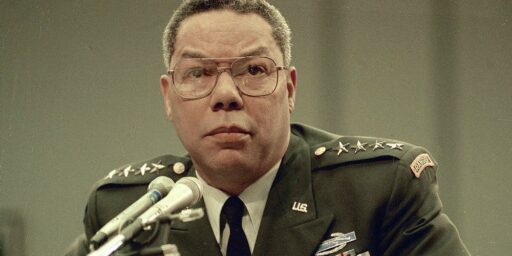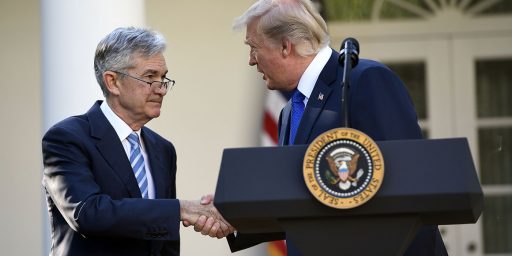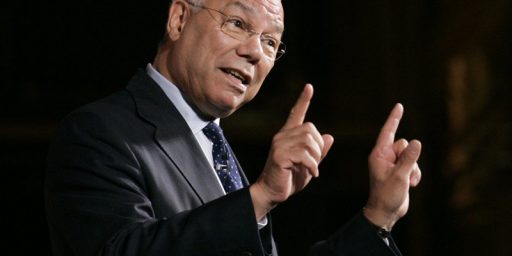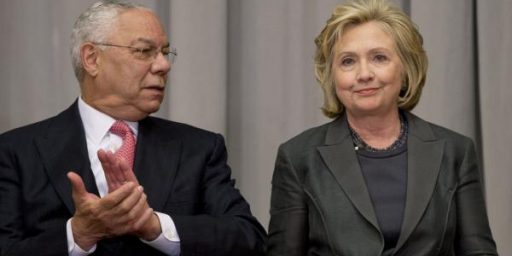DEAN FOREIGN POLICY
This afternoon’s WaPo, tonight:
Democratic presidential candidate Howard Dean said he would offer a package deal to North Korea to give up its nuclear weapons programs and he embraced an unofficial peace plan that establishes the borders of a Palestinian state — breaking dramatically with the approaches of the Bush administration.
Dean, who has risen to the top of the Democratic field in part because of his early and vehement opposition to the war in Iraq, also said he favors immediate elections in Iraq to replace the U.S.-appointed Iraqi Governing Council, which he said is viewed by the average Iraqi as “simply a council of American-chosen puppets.” Dean further said he would end funding for the deployment of a missile defense system, a centerpiece of President Bush’s presidential campaign four years ago.
But in a wide-ranging 50-minute interview on foreign policy, given as he flew from Burlington, Vt., to Omaha on Friday, Dean also indicated he agreed with a number of Bush’s foreign policy stances. In a speech Monday, Dean will seek to counter his image as a darling of the left by positioning himself as a centrist Democrat on foreign policy. Dean portrayed himself as a realist, willing to use military force if necessary, and to maintain relationships and alliances, even if freedom and democracy in countries such as Russia and Pakistan are eroded.
Indeed, Dean suggested that on some issues, the difference between Bush and himself was more of tone and temperament. He said, for instance, he would not have warned Taiwan not to hold a referendum on Chinese missiles if the Chinese premier was at his side, as Bush did last week. “The president’s policy is right, but the president’s public slap [at Taiwan] wasn’t necessary,” Dean said.
“Nuance matters in foreign policy,” Dean said. “Not only does this administration have a tin ear and want to push through whatever they want to do without regard to people’s feelings or thoughts, I think nuance escapes this administration.”
The interview, the first time Dean has been questioned in detail about his foreign policy views, appeared to be part of an effort to transform Dean from a candidate known largely for a single, defining issue — opposition to the war in Iraq — to someone with the gravitas to be president and deal with the complex foreign policy challenges of the age.
A necessary and difficult transformation, to be sure.
The piece doesn’t offer much detail on the policies above, but it sounds like a policy line somewhere between Jimmy Carter and Bill Clinton:
During the interview, Dean staked out new ground in several important areas. While Bush has tried to forge a five-nation coalition to confront the North Korean crisis — and refused to hold direct talks with Pyongyang — Dean said he would move immediately to bilateral negotiations with the communist nation. Dean’s package deal would include economic aid, energy assistance and what he called a “nonaggression pact” in exchange for a dismantling of North Korea’s nuclear program that was verified through “an intrusive inspection regime.”
Pyongyang has called for such a package of incentives, including a nonaggression treaty. But Bush has rejected a treaty, offering instead written assurances of nonaggression. Bush also has been vague on what incentives, if any, he might offer once the nuclear programs are ended. “North Korea is an example of this president dawdling and dallying for 15 months because the hard-liners in his administration, of which apparently he is one, thought a small nation, a few tens of millions of people, could blackmail us,” Dean said.
“Down the line,” Dean said, North Korea “ought to be able to enter the community of nations. We have much better control over the rogue behavior of errant states if they are in the tent than not.”
On the Mideast peace process, Dean said he agreed with Bush’s decision to cut off relations with Palestinian leader Yasser Arafat. But he supported the concept behind what is called the Geneva Accord, which resolves border issues and other vexing matters before the negotiations envisioned in the U.S.-backed “road map” plan. “I think that’s the right thing to do,” he said, though he was not yet willing to “sign on to every last detail.” The Bush administration has said it would not entertain such “shortcuts.”
Dean is surrounding himself with some credible advisors:
One of his foreign policy aides, Ivo Daalder of the Brookings Institution, sat at his side as he tackled back-to-back newspaper interviews on foreign policy. ***In addition to Daalder, campaign aides said, Dean’s core foreign policy team includes former national security adviser Anthony Lake; retired Gen. Joseph Hoare, a former chief of U.S. Central Command; retired Gen. Merrill A. “Tony” McPeak, former chief of staff of the Air Force; two former assistant secretaries of defense, Ashton Carter and Frank Kramer; former assistant secretary of state Susan Rice; and political theorist Benjamin R. Barber. Danny E. Sebright, a former Defense Department civil servant who works for the consulting firm headed by Clinton defense secretary William Cohen, is Dean’s foreign policy coordinator.
This is also interesting, although I suspect Powell will quickly demur:
In the interview, Dean lavished praise on Secretary of State Colin L. Powell, saying he never understood why he was a Republican since “his advice is simply for the most part ignored.” One Dean adviser said he has discussed with Dean the possibility of keeping Powell on as secretary of state. “That may or may not be in the cards,” Dean said, emphasizing that it was too early for that kind of discussion. “We’ve put almost no time into that [discussing cabinet selections] whatsoever.”






Ah, yes, bribery as foreign policy. I’m sure the Japanese would look kindly to us paying off North Korea again AND cancelling a US-Japan missile defense system. (Japanese nukes, here we come!)
Interesting, it’s ok to pay off an enemy (N. Korea) and we have to allow Iraq War opponents to profit from its reconstruction. Sounds like the only groups that won’t get paid off are those “evil” corporations.